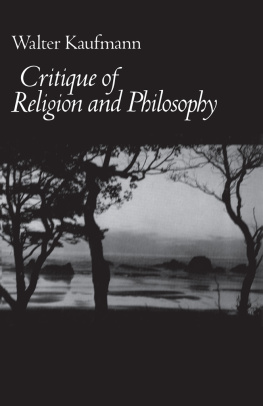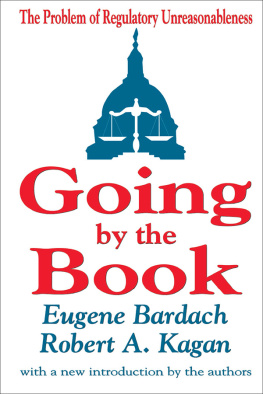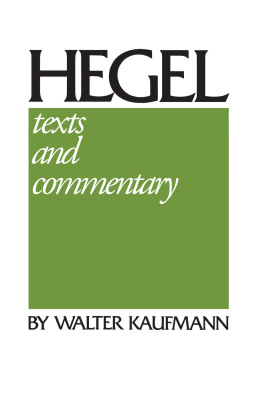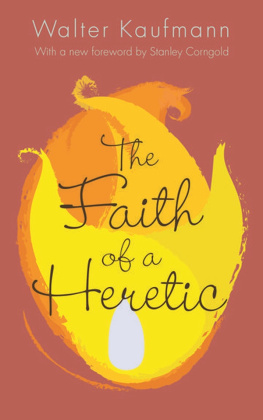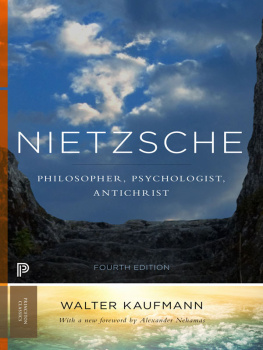Corngold - Walter Kaufmann: Philosopher
Here you can read online Corngold - Walter Kaufmann: Philosopher full text of the book (entire story) in english for free. Download pdf and epub, get meaning, cover and reviews about this ebook. City: Princeton;UNITED STATES;United States, year: 2019;2018, publisher: Princeton University Press, genre: Science. Description of the work, (preface) as well as reviews are available. Best literature library LitArk.com created for fans of good reading and offers a wide selection of genres:
Romance novel
Science fiction
Adventure
Detective
Science
History
Home and family
Prose
Art
Politics
Computer
Non-fiction
Religion
Business
Children
Humor
Choose a favorite category and find really read worthwhile books. Enjoy immersion in the world of imagination, feel the emotions of the characters or learn something new for yourself, make an fascinating discovery.
Walter Kaufmann: Philosopher: summary, description and annotation
We offer to read an annotation, description, summary or preface (depends on what the author of the book "Walter Kaufmann: Philosopher" wrote himself). If you haven't found the necessary information about the book — write in the comments, we will try to find it.
Walter Kaufmann: Philosopher — read online for free the complete book (whole text) full work
Below is the text of the book, divided by pages. System saving the place of the last page read, allows you to conveniently read the book "Walter Kaufmann: Philosopher" online for free, without having to search again every time where you left off. Put a bookmark, and you can go to the page where you finished reading at any time.
Font size:
Interval:
Bookmark:
WALTER KAUFMANN
Walter Kaufmann
PHILOSOPHER, HUMANIST, HERETIC
PRINCETON & OXFORD
Copyright 2019 by Princeton University Press
Published by Princeton University Press
41 William Street, Princeton, New Jersey 08540
6 Oxford Street, Woodstock, Oxfordshire OX20 1TR
press.princeton.edu
All Rights Reserved
Library of Congress Control Number: 2017964104
ISBN 978-0-691-18406-7
British Library Cataloging-in-Publication Data is available
Editorial: Rob Tempio and Matt Rohal
Production Editorial: Mark Bellis
Jacket/Cover Design: Pam Schnitter
Production: Erin Suydam
Publicity: Jodi Price
This book has been composed in Arno
Printed on acid-free paper.
Printed in the United States of America
10 9 8 7 6 5 4 3 2 1
PRINCETON UNIVERSITY PRESS has undertaken to reprint, with new introductions, many of Walter Kaufmanns most important books. It is a fine thing to do, I think, for several reasons: it honors an eminent, German-born migr scholar who taught in Princetons Department of Philosophy from 1947 until his untimely death in 1980; and it honors a reading public that seems eager to read his works, in many cases, for the second time. When I recently told a younger scholar that I intended to write a book about the works of Walter Kaufmann, he greeted the idea, saying how important they had been to his father. They came out in Anchor Books, didnt they? I wish Id kept my fathers copies. The result was that these books were no longer immediately available to my friend, and the implication was that he would read them if they were.
There is furthermore a wider audience that, to take one special case, is poised to read Kaufmanns celebrated work The Faith of a Heretic. It seems a good thing to give other readers the opportunity to test this idea. My surmise about the general interest in Kaufmanns work is supported by what the German playwright Bertolt Brecht called plumpes Denken (approximately, blunt thinking). Consider that the cheapest hardback copy of The Faith of a Heretic found on Amazon at this time of writing ranges between $62 and $495, the cheapest paperback between $92 and $195! If price is indeed a measure of demand...
What they will find in Kaufmann is a scrupulous humanistic moral philosophy. Add to Ozicks remark the words of a young professor of history, Molly Worthen, writing in 2015:
As nonbelievers tangle with traditional Christians over same-sex marriage and navigate conflicts between conservative Muslims and liberal democracy, they will need a confident humanist moral philosophy. The secular humanist liberation movement, in its zeal to win over religious America, should not encourage nonbelievers to turn away from their own intellectual heritage at the time when they will want it most.
If not turning away from ones religious heritage means actively turning toward it, that movement should also include the most unabashed criticisma crucial task, following Kaufmann, whose heretical faith is the product of a lifelong critique of religion. During the Vietnam War, which appalled him, he wrote, My plea is that in cultivating ethics, philosophy and the other fields, we examine our traditional faith and moralsquestions of faith and practice.
This book is an attempt to heighten the pleasure and instruction you will find in Kaufmanns work and not a substitute for it. Emphasis falls again on Kaufmanns work: this book is an intellectual biography, in the way that Kaufmann describes The Faith of a Heretic: The heretic in The Faith of a Heretic is myself. But the book doesnt tell the story of my life. It is an attempt to describe my views. That is also the aim of the book that you now hold in your hands... or on your Kindle.
If you have read Kaufmanns translation of Nietzsches Thus Spoke Zarathustra, you may recall that Nietzsche anticipated a time when the nobility would abandon their loyalty to a Vaterland (fatherland) for a Kinderland (childrens land)a time and place of the childlike courage to create new values in Kaufmann died just before the digital revolution; one can only imagine the intellectual frontiers he would have conquered with digitally enhanced tools of writing and research.
Although I have this digital advantage, I want to forecast the limitations of this book. I do not know all the things Kaufmann knew before he set pen to paper (unlike him, I read very little Aramaic... and no Pali at all). Many of these things would have been available only to a student, like Kaufmann, of a classical German Gymnasium and thereafter at the Institute for Jewish Studies in Berlin, where they would have been received in a way that cannot be captured today. You can attempt to read all the books Kaufmann read and excerpted in philosophy, history, comparative religion, comparative literature... or begin to, for their number beggars belief. It may also be that all Kaufmanns philosophizing, as Nietzsche wrote, is a return and a homecoming to a remote, primordial, and inclusive household of the soul that we share and out of which those [philosophical] concepts grew originally.
I treat Kaufmanns major works one by one, in the order of their publication, mainly keeping to one side the foreknowledge of what he was still to write. I enjoy, and I hope you, reader, will enjoy this journey to ideas as yet unknown. Along with my admiration for most of his work, I have obviously taken liberties with the idea of a pure exposition: I have not followed all of Kaufmanns precepts on composition. In Hegel: A Reinterpretation, Kaufmann encourages the critic not to sell the philosophers ideas short in order to expound his own views. I ignore this precept not so much to offer my own views as to offer the In 1954 Kaufmann wrote:
What is the point of a book on a thinker? It can have mainly two valid purposes: to get people to read and understand him because he has something worthwhile to offer; or to combat him and to show that what he has to offer is unacceptable. These two aims are not mutually incompatible.
At the end of his life, some twenty-five years later, Kaufmann stressed the point: An interpreter of a philosopher, poet, or statesman must have some grasp of the mind or mentality of the subject... and finally the still more difficult grasp that requires the critical rethinking of the writers ideas (emphasis added).
In his Hegel, Kaufmann also wrote that one must do better than attempt to describe everything one reads in a book; productive criticism addresses and goes deeply only into selected passages. I have not described everything in Kaufmanns books, but I have striven to give as full an accounting of their contents as I couldconsistent with the desire that the account be pleasurable and interesting.marginal commentaries from the authordemurrals, additions, and exclamation points of appreciation. That is the case here: it is a critical exposition.
At this point, readers who have glanced inside this book may wonder why it includes so many direct quotes from Kaufmanns writing. I cite him often because his voice in his work is far more resonant than that of any commentators. A friend of Kaufmann, the philosopher Ben-Ami Scharfstein, remembers him as an individual whose voice speaks (I hear it clearly) from each page he wrote.
I also cite Kaufmann because his work is not otherwise available in so condensed and extensive a form as in this book. It would be best, of course, if readers would go directly to Kaufmanns opuses and read them through, although their volume, including the writings of others he reproduces in his anthologies (and even leaving his numerous articles and translations aside) totals some eight thousand printed pages. I especially wanted to reproduce the richness of his work in his own voice out of a feeling of dismay on reading many of the reviews his work received during his lifetime. Almost nothing of his verve, erudition, and synthetic power can be gotten from these screeds, which, on the example of Kaufmanns magnum opus
Font size:
Interval:
Bookmark:
Similar books «Walter Kaufmann: Philosopher»
Look at similar books to Walter Kaufmann: Philosopher. We have selected literature similar in name and meaning in the hope of providing readers with more options to find new, interesting, not yet read works.
Discussion, reviews of the book Walter Kaufmann: Philosopher and just readers' own opinions. Leave your comments, write what you think about the work, its meaning or the main characters. Specify what exactly you liked and what you didn't like, and why you think so.




